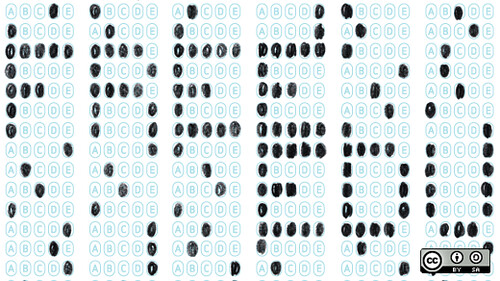An ANOVA (lead to Table 2) revealed a primary impact of first-generation status such that first-generation trainees reported taking part in significantly more behaviors to offset textbook costs than continuing-generation trainees. There was no substantial result of ethnic minority status nor an interaction in between first-generation and ethnic minority status on the variety of alternative habits reported.
A MANCOVA (lead to Table 2) taking a look at how regularly book expenses impacted other student behaviors (e.g., dropping a course), revealed no considerable main effect of ethnic minority status. There was a significant main result of first-generation status, but this was qualified by a considerable interaction in between ethnic minority and first-generation status.
Specifically, as portrayed in Figure 1, first-generation students reported taking part in the following behaviors considerably more frequently as a result of high book costs: taking less classes, not registering for a particular class, and dropping/withdrawing from a class. As depicted in Figure 2, one product (made a bad grade since I could not afford to purchase the book) showed a considerable main effect of first-generation status, along with a substantial interaction in between first-generation and ethnic minority status.
On the other hand, there was a substantial effect of ethnic minority status in first-generation students, such that those who are first-generation and an ethnic minority reported that they make poor grades due to the fact that of high text expenses substantially more typically than those who are first-generation and an ethnic bulk, [t( 222) = 2.06, p = 0.040, d = 0.280].
Bars illustrate means, error bars represent basic errors of the mean, * indicates p < 0.05. Self-reports of making a bad grade due to the fact that students could not pay for a book, by first-generation and ethnic minority status. Bars portray methods, mistake bars represent standard errors of the mean, * indicates p < 0.05.
Self-reports of making a bad grade due to the fact that students could not pay for a book, by first-generation and ethnic minority status. Bars portray methods, mistake bars represent standard errors of the mean, * indicates p < 0.05.
Interactions in between these variables were included in extra steps and more exposed no significant enhancement in the design, 2 = 9.53, p = 0.657. All subsequent analyses were carried out using only those trainees who reported utilizing the book (n = 228 open, n = 169 commercial). There was no considerable multivariate impact of textbook group on students' perceptions of the quality of the book, F( 17, 264) = 0.79, p = 0.700, p2 = 0.049.
There were furthermore no considerable effects of first-generation [F( 17, 264) = 1.152, p = 0.305, p2 = 0.069] or ethnic minority status [F( 17, 264) = 1.176, p = 0.284, p2 = 0.070] on understandings of the quality of the books, nor any interactions between any of these 3 variables [ethnic minority status x first-generation status, F( 17, 264) = 0.691, p = 0.812, p2 = 0.043; book group x first-generation status, F( 17, 264) = 1.074, p = 0.379, p2 = 0.065; textbook group x ethnic minority status, F( 17, 264) = 0.960, p = 0.505, p2 = 0.058; textbook group x first-generation status x ethnic minority status, [F( 17, 264) = 1.195, p = 0.268, p2 = 0.071].
Bars portray methods, mistake bars represent basic mistakes of the mean. Last course grades were transformed from letter (e.g., A, B, C) to a basic GPA scale (A = 4.0, B = 3.0, C = 2.0, etc.). General course grades did not differ by book group (open vs. business) [F( 1, 327) = 0.01, p = 0.930, p2 < 0.001], or ethnic minority status [F( 1, 327) = 0.22, p = 0.642, p2 = 0.001].
business) [F( 1, 327) = 0.01, p = 0.930, p2 < 0.001], or ethnic minority status [F( 1, 327) = 0.22, p = 0.642, p2 = 0.001].
There was no interaction between first-generation status and textbook group [F( 1, 327) = 0.027, p = 0.870, p2 < 0.001], indicating that the result of first-generation status on course performance was not connected to the textbook utilized in the course (Figure 4). There was likewise no significant interaction between ethnic minority status and textbook group [F( 1, 327) = 1.480, p = 0.225, p2 = 0.005] nor a significant interaction in between all 3 variables [F( 1, 327) = 1.006, p = 0.317, p2 = 0.003] on course results,.
Bars illustrate means, error bars represent standard errors of the mean, * suggests p < 0.05. Outcomes from today study assistance several conclusions. First, they demonstrate that first-generation and ethnic minority students experience more negative results as an outcome of book costs than their peers. Particularly, first-generation trainees more frequently report taking fewer classes, not registering for a particular class, and dropping/withdrawing from a class as a result of high textbook costs, while trainees who are both first-generation and an ethnic minority more frequently report making bad grades due to the fact that they are unable to pay for books.
Many advocates of OER comply with the "gain access to hypothesis," which refers to the concept that OER improve efficiency due to the fact that more trainees have the ability to access the textbook (Grimaldi et al., 2019). Contrary to this hypothesis, we failed to spot differences in the portion of trainees who reported using the open vs.
If it is accepted that a core problem attended to by OER is access to books for those who are otherwise unable to afford them, it is likewise logical that OER would predominantly benefit those students not able to purchase a business textbook. Grimaldi et al. (2019 ) performed a set of simulation research studies to examine this issue.
When the access number increases to 90%, the opportunities of successfully turning down the null hypothesis drops to 19%. This work suggests that tests of the gain access to hypothesis of OER demand acknowledging that only a little number of students may be helped by these texts. Thus, outcomes may be statistically non-significant, albeit still of immense practical significance for the trainees favorably impacted by access to a free book.
Although null outcomes are often considered ambiguous, we consider this result to be beneficial. In today research study, 600 trainees across six sections of the course were relieved of a textbook expense of $100. Even with a conservative price quote (40% of trainees purchasing the book new), this represents a minimum savings of $24,000.
Because of that savings benefit, demonstrating that trainees' outcomes are not damaged by the use of OER is sufficiently compelling to support its use. It is likewise essential to think about these findings in the context of students' wellness beyond this one course. Trainees typically enroll in several courses each semester.
In this manner, the positive ramifications of OER use in one course might broaden to positively affect students' performance in other courses. This represents an important insight on the wider indirect benefits of OER usage. Potentially useful indirect impacts of OER might be especially impactful for marginalized trainees. Certainly, this research study offers further proof that the increasing expenses of books is an issue of racial and class equity.
However, this is the first research study, to our knowledge, to show that these inequitable concerns develop, at least partially, as a result of book expenses. Marginalized trainees are making a variety of decisions about their scholastic life based upon textbook costs, consisting of which courses to take and whether to drop specific courses.





